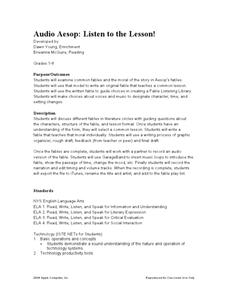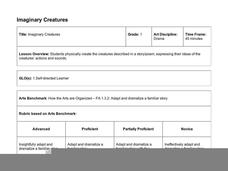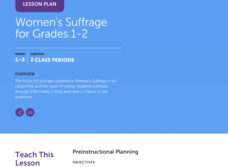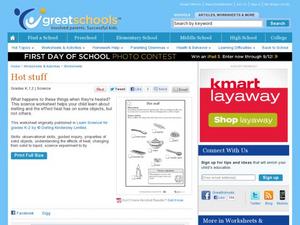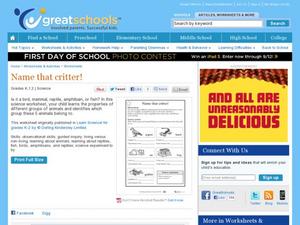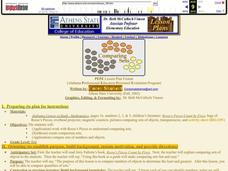Curated OER
1st Grade - Act. 09: Freedom Quilt
First graders create sections of classroom quilt that be tied together.
Perkins School for the Blind
Build a Word
Get out those scrabble tiles and a braille tape labeler because today we are playing a build-a-word game! Label several sets of scrabble tiles using the braille labeler, place them in a box, and have children take turns pulling letter...
Baylor College
How Do We Use Water?
Send youngsters home to survey how they use water in their homes. Then bring them together to discuss which uses are essential for our health and which are not. A helpful video offers teaching tips for this lesson, and a presentation...
Baylor College
Needs of Plants
What better way to learn about plant life than by creating a class garden? Young botanists start with a brief discussion about radishes before planting seeds and watching them grow. To determine the importance of water,...
Baylor College
Needs of Living Things: Post-Assessment
Assess your class's knowledge of the needs of living things with the final lesson in a series. Given a large piece of paper and coloring utensils, young scientists draw a picture of themselves and a plant or animal of their choosing,...
Curated OER
Audio Aesop: Listen to the Lesson!
Aesop's Fables are the focus of this language arts lesson. Young philosophers study and discuss the morals found in the most famous of Aesop's Fables. They write an original fable that teaches a common moral. A "Fable Listening Library"...
Hawaiʻi State Department of Education
Imaginary Creatures
Drama and movement are wonderful ways to cover story elements such as setting, character, and descriptive writing. Little ones listen to a poem about imaginary creatures. As they listen, they shape their bodies into what they think the...
Curated OER
Pastimes
Students define and discuss personal pastimes, listen to the story Owl Moon by Jane Yolen, discuss owling as rural pastime, demonstrate comprehension by writing responses to story, and discuss how climate and geography often determine...
Scholastic
Women's Suffrage for Grades 1–2
Scholars take part in a grand conversation after they examine facts and stories about the Women's Suffrage Movement. Eight discussion questions bring light to influential women, the importance of voting, citizenship, and voting rights.
Ware County Schools
Simple Directions
When teaching someone how to do something, it's important to give clear directions. Your youngsters can practice their skills by completing these worksheets meant to help learners describe the steps in a process. It's not just any...
Curated OER
Tomato Exploration
Create tomatoes in 15-20 minutes using this fun and interactive lesson plan! Learners listen to a book about tomatoes (recommendations listed), and focus on the vocabulary word tomato. They count the syllables...
Curated OER
Word Wizards: Students Making Words
Students explore patterns in words and how to make new words by adding or changing the sequence of letters
Curated OER
The President's Roles and Responsibilities: Communicating with the President
Young scholars examine the roles and responsibilities of the U.S. president and their own roles as citizens of a democracy. They explore various websites, listen to a State of the Union address, and write a letter to the President of the...
Curated OER
Hot Stuff
Very young scientists who are learning about solids, liquids, melting, and freezing will use this worksheet to identify things that would melt if put in a warm place. There are eight objects altogether, and learners place a check mark...
Curated OER
Name That Critter
Young learners classify five different animals into their proper category. The animals pictured are a pigeon, a lizard, a cat, a frog, and a goldfish. Pupils are also asked to tell why they know it's a certain kind of animal. An...
Curated OER
Ring-A-Ding-Ding!
What sound does metal make when you hit it? Kindergartners and first graders conduct an experiment about the properties of metal. First, they draw a line between metal items and descriptions of each. Next, they use a magnet to see which...
Curated OER
Bug Hunt
Students strengthen observational skills by searching for insects in their home and classroom. In this observation lesson plan, students use magnifying glasses to classify what kinds of bugs were found. Students then create a bar graph...
Curated OER
Comparing Sets
Kindergarteners and first graders work with Reese's Pieces to explain comparing sets, create comparison sets, and compare sets of numbers and objects. A good lesson that uses a "tasty" manipulative!
Curated OER
Telling Time Lesson Plan
Judy Clocks are a great invention. Here, learners review telling time to hour and half hour on Judy clocks, begin telling time to quarter hour, use clock stamps to practice, and play computer games using Trudy's Time and Place House...
Indian Land Tenure Foundation
Elders' Stories
Very young learners study the ways that oral traditions play such a huge part in the culture of Native Americans. They see how Elders pass along stories to the younger generations. If possible, a tribal Elder comes into the class to...
Curated OER
The American Revolution and Williamsburg
Williamsburg provides a way for students to learn about the American Revolution.
Curated OER
Out of This World: Counting to 18
In this counting learning exercise, students count sets of space related objects, writing the number counted, then color object sets of 18.
Curated OER
Language Arts: Then and Now
First graders hear Great Grandma and I. They locate objects representing then (seed) and now (tomato). They make then and now charts for members of their families.
Curated OER
Then and Now
First graders explore teacher created exploration tub, charts and cards to explain the concept of "Then and Now."





